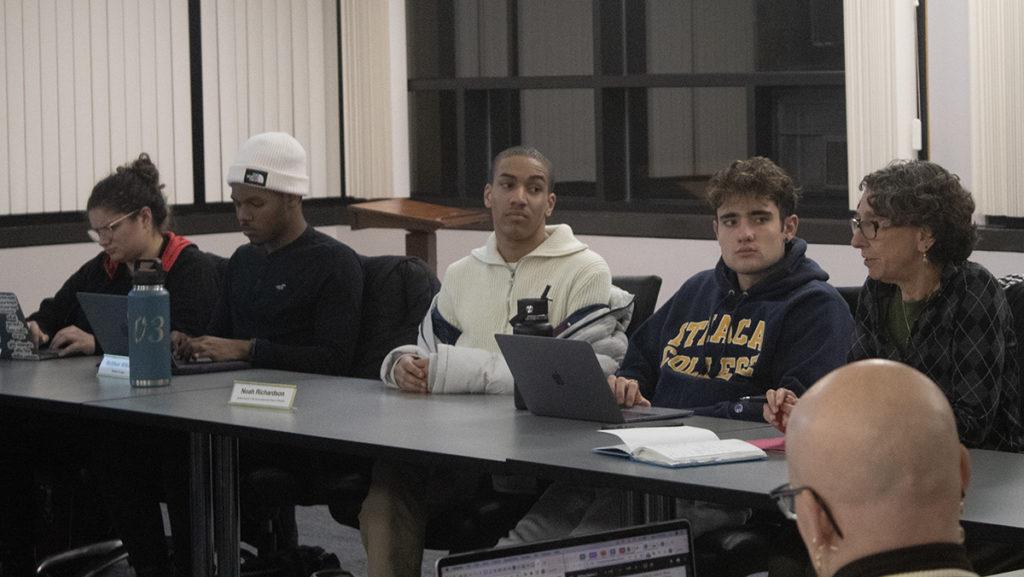Returning for its first meeting of Spring 2023, the Ithaca College Student Governance Council (SGC) welcomed guest speaker Melanie Stein, provost and senior vice president of academic affairs.
Stein began by discussing ongoing changes to the college’s curriculum that will be in full effect by Fall 2023.
“Where it’s coming from is a response to department chairs and administrators hearing repeatedly from students, a series of frustration,” Stein said. “We heard this from students, we want [administrators] to take that to heart, and want you to go take a look at your curriculum, and look at it from the point of view of flexibility, and make it possible for students to do everything they want to at IC.”
Stein said most departments work on a three-credit-based curriculum, which does not match with other institutions in the country. She said this will bring department classes up to four credits to lessen the number of classes, while also giving students intensive programs in which they can succeed.
“The focus is on flexibility and thinking about what [faculty] are doing,” Stein said. “Each course would be more intensive. It is the same amount of content, just how it is divided up [is] into individual courses.”
Sophomore Noah Richardson, student director of the alumni board, said he is concerned about faculty. He asked if current faculty will be required to teach more classes or if the college plans to hire more faculty.
Stein said the goal of changing most three-credit courses to four credits is to put less stress on both faculty and students through lessening the number of credits taught or taken while making sure that students can explore all that the college has to offer.
“It’s not an expansion, it’s a revamping,” Stein said.
Stein then explained how shared governance functions at the college. She said the lack of trust between faculty and administration is an issue when combating challenges. Stein said she invites students’ input and plans to educate the student body on how shared governance works as a way to be transparent about decision making. The governance structure includes the president, provost, President’s Cabinet and Board of Trustees along with faculty, staff and student input. Students have taken issue with how this method that is designed to be clear is in practice confusing to understand and has issues in transparency.
Sophomore Hannah Ahmed, Class of 2025 senator, said she is concerned about how Stein has handled communicating with students in the past.
“When everybody is focusing on faculty and administration, the students are left astray,” Ahmed said. “It’s frustrating because I feel these conversations are happening frequently. I want to see change in the conversions we’re having.”
Stein said faculty need to consider the way they distribute credits for the new curriculum and went on to elaborate why she does not tell the academic deans they must take input from students.
“It wouldn’t make sense for students to have responsibility for the curriculum, it has to be a faculty responsibility,” Stein said. “You do want students to have meaningful input. The answer, ironically, is because there would be a revolution because of shared governance. The faculty have a responsibility for their curriculum.”
Ahmed said in response to Stein that she thinks faculty does not need to be convinced to take responsibility.
“At the end of the day, it’s frustrating,” Ahmed said. “If you really wanted it, you would have had it.”
Before leaving, Stein said students can discuss problems with members of their departments and their deans.
“I think fundamentally that most departments and faculty would want to hear from students,” Stein said.
Sophomore Cameron Small presented his application to become Class of 2025 senator, a position previously held by Richardson. Small said he wants to create a safe space for students of color and LGBTQ+ identifying students. He said he would focus on improving mental health, spreading awareness, social events and a podcast that calls attention to the social issues new students face.
“My entire freshman year was spent in my dorm room,” Small said. “I think the mental health of students of color especially goes unnoticed. … I know there are spaces here, and I would also like more transparency for those spaces and students that want to go there.”
The SGC then looked at the application of junior Noah Strathman for the position of vice president of business and finance. Strathman’s plans include making funding easier to obtain for workshops and clubs, simplifying a process he thought may seem too complicated, a process that goes through the Appropriations Committee.
Both Small and Strathman were elected unanimously by the SGC senate.
Senior Senate Chair Austin Ruffino said the Code of Conduct Amendment is set to be re-tabled in 14 days. This bill, which has been previously discussed at the Nov. 15, 2022, SGC meeting, focuses on expanding the SGC code of conduct, making SGC meetings more inclusive and will establish a code of conduct that is expected from members.
“We’ve reworked the language and will send it out to be presented in two weeks,” Ruffino said. “This bill makes us have a more welcoming environment where everyone can speak their mind.”








